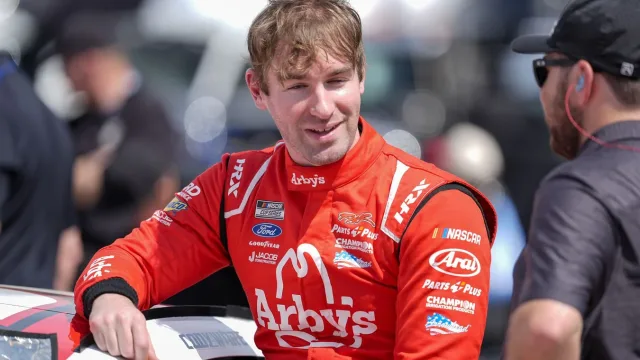Chris Buescher praises Cody Ware decision following last Sunday’s intense Chicago Street Race incident, where Ware’s rapid judgment prevented a multi-car crash. The event unfolded as Cody Ware, driving for another NASCAR Cup Series team, suffered brake failure and chose a risky but protective course of action by heading straight for a tire wall rather than jeopardizing others on track.
During media interviews at Sonoma Raceway on Saturday, Buescher, who drives for Roush Fenway Keselowski Racing, highlighted the rarely seen sportsmanship and presence of mind displayed by Ware during a dangerous moment. While aggressive racing is common, it is less frequent to see a driver willingly sacrifice their own race to protect the field.
Ware’s Brake Failure and Immediate Response
Ware encountered the issue as he approached a critical turn on the Chicago circuit, when his brake pedal ceased to function. He was faced with the split-second decision to try to use another car to slow down, which could have resulted in significant damage or injury, or to take himself out of contention safely. Ware steered directly into a tire wall, executing a solo crash that avoided impact with any other competitor.
Buescher recounted his close proximity to the incident, noting how quickly danger escalated.
“I’d seen him blow a rotor and I seen the parts scatter as soon as it happened. I was right there.”
—Chris Buescher, NASCAR driver
Despite the severity of the collision, Ware emerged only sore, surprising Buescher, who checked on him after the race and expressed his respect for the tough decision made in a critical instant.
Recognizing the Difficulty of Choosing Safety Over Instinct
Buescher spoke candidly about the internal struggle drivers face when something goes wrong mechanically, particularly at high speed.
“I did tell him, ‘I commend you for turning it right’ because that is the hardest thing to convince yourself as a driver if you have a failure, to turn into the wall to try and knock speed out. Instinct is to turn away and say, ‘I’m going to save this, I’m going to get there.’ He did everything right that he could do in that moment.”
—Chris Buescher, NASCAR driver
Such comments highlight just how difficult it can be to override a driver’s reflexes in the chaos of a brake failure, especially on a street course where run-off options are limited.
The Dangers of Tire Wall Collisions
Some fans underestimate the violence of hitting a tire wall, but Buescher stressed that it is anything but a soft impact at racing speeds. If Ware’s issue had taken place on an oval, the outcome might have been less severe. But on a narrow, temporary street circuit, the collision was both significant and unavoidable.
“If it had been an oval, he’d have scrubbed the wall all the way around the corner and come in and said, ‘Man, that sucked,’”
—Chris Buescher, NASCAR driver
“But with a street course like that, that impact was massive. I’m glad he’s okay. It’s just really unfortunate.”
—Chris Buescher, NASCAR driver
Buescher relates personally, having experienced his own mechanical failures.
“I’ve had rotors blow out and you typically just don’t get a warning,”
—Chris Buescher, NASCAR driver
“That initial stab of the (brake) pad and it falls apart and you’re along for the ride.”
—Chris Buescher, NASCAR driver
Why Driver Decisions Matter in High-Stakes Moments
Buescher’s tribute to Cody Ware underscores the respect drivers have for each other’s safety and decision-making under duress. On a day when a split-second reaction could have changed the outcome for multiple drivers, Ware’s actions potentially saved not just equipment but lives. Such moments serve as a reminder of the risks involved in NASCAR Cup races, the trust among drivers on the circuit, and the importance of professional judgment, especially when mechanical failures arise on challenging venues like the Chicago Street Race.
